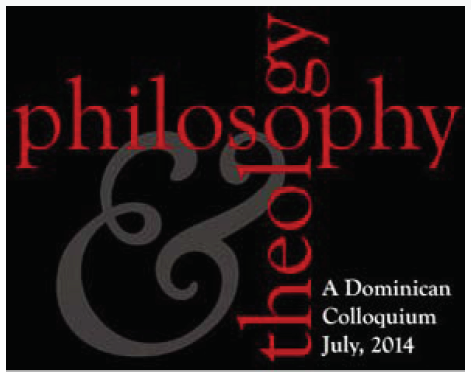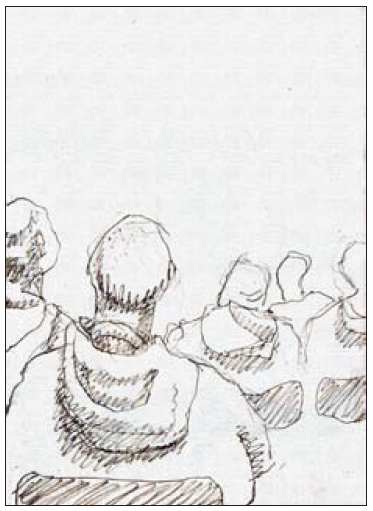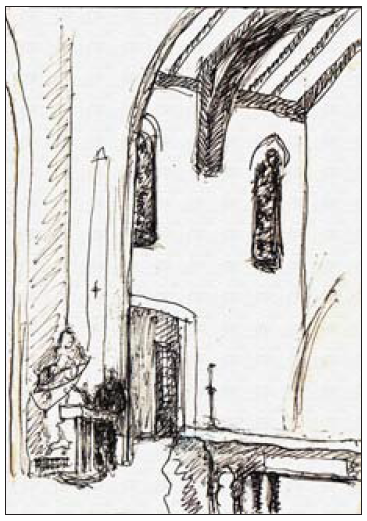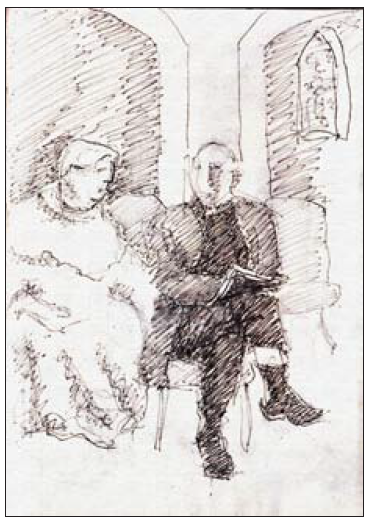Between Athens and Jerusalem: The First International Colloquium of Philosophy and Theology
Published in: 25. Of all the…The event we wish to describe can in no way be called ordinary or typical. As a phenomenon, it more likely ranks with the incredible. The following surveys the first international theological and philosophical colloquium — dedicated to the integration of philosophy and theology — organized by the Dominican School of Philosophy and Theology, an institute affiliated with the prestigious Graduate Theological Union of the University of California at Berkeley. Most of the colloquium’s program was hosted by St. Albert’s Priory, situated in a quiet enclave near a highway running along one edge of the city.
The colloquium takes its title from a quote: “What has Athens to do with Jerusalem?” The question’s author isn’t specified, although his identity is surely no secret for most present. Nominally, the colloquium is open to everyone, but the limited number of spots determines the audience’s overall level, with participants primarily either serious professionals, often of international repute, or interested graduate students.
Although the provocative words of Tertullian, an outstanding thinker of early Christianity, were originally meant rhetorically — he believed Jerusalem’s wellspring of faith and Athens’ school of reason could share nothing in common — the question in fact remains open. Philosophy’s role in the cultivation of minds has retained its significance for Christian thought over the course of centuries, despite the influence of particular eras and claims against it. By the thirteenth century, when the fruits of ancient culture began to reemerge among the baggage of European civilization, work on a worthy bond between theology and philosophy was already well under way.
Albert the Great and his pupil Thomas Aquinas, the most prominent figures in framing this process, happened to belong to the Dominican Order. Thomas’ fundamental work Summa Theologica was and remains among the most important pillars of Christian thought — in both its content and its precedent of applying philosophical thought in the light of faith, which offers a way to go beyond the bounds of logic. The direction indicated by Thomas, and thus called Thomism, remains requisite for the formation of Catholic theologians. As a keystone of medieval Scholastic philosophy, Thomism has been repeatedly subjected to serious criticism, to the point of complete rejection by secular philosophy after the Renaissance. Yet Thomas’ intellectual feat has won the admiration even of his opponents, while others have found him an inimitable paragon. He remains an authority for a wide range of contemporary scholars and philosophers.
At St. Albert’s Priory, sets of Thomas’ works are part of the everyday background. He is studied at the Dominican School and constantly referenced at the colloquium — more often, it seems, than Scripture, and this is fine and shows good form. His works are voluminous and complex, although surprisingly accessible. Many of those present are thoroughly fluent in them and readily quote them from memory.
Thomism is not a closed, stifling system. The contemporary theologians featured at the colloquium view any philosophy much as Thomas approaches Aristotle in the Summa: as if recognizing that any manifestation of rational human thought can elicit something of value, and hoping on the other hand to infuse philosophy with content from outside the field of its standard application. As the theologians themselves put it, their privilege is a view from above — a means to elevate, adjust, from the outside, and expand the legacy of philosophical thought, thus enriching and revitalizing the course of its development.
Accustomed to gathering as a community several times a day to observe the liturgical hours, the monks never waver in this regime during the colloquium, holding regular services in the monastery’s elegant Tudor-style basilica, which also serves as a forum for almost all the plenary sessions.
Asked how he feels about the colloquium, one of the monks replies: “It doesn’t get any better than this!” Indeed, lovers of theology and philosophy seem to be in an earthly paradise. Experts are gathered here not only from all over the United States, but also from the best European universities, even from the Vatican. The Order’s current leader, its Master General, Frenchman Fr. Bruno Cadoré, also honoring the colloquium with his presence, delivers an address comprising his answer to the headlining question. “What has Athens to do with Jerusalem? What has philosophy to do with theology? Everything! Using the gift of reason to seek an explanation, to search for truth. … In a state of crisis, when we have lost the ability to situate ourselves in the perspective of a time which holds any promise, theologians call on philosophers to think together.”
Addressing the prior of the Western Dominican Province in an official letter made public before the colloquium’s opening, the Master General’s assistant Fr. Michael Mascari distills the event’s ideological essence: “In a time when specialization increasingly threatens to isolate one field from another, deliberate efforts to promote interdisciplinary study are more welcome than ever. This is especially true of philosophy and theology, the two disciplines closest to the heart of our mission as Dominicans.”
During the days of the colloquium, the predominance of white Dominican robes among any group gathered in conversation comes to appear commonplace. It also ceases to amaze that one can hear a monk talking about anything at all — for instance, his drive here, spent singing along to the Rolling Stones’ Exile on Main Street. “If you have questions,” says the Dominican School’s Regent of Studies, Fr. Brian Kromholtz, pointing toward his brothers in the Order, “just ask anyone who’s dressed like that.”
One Dominican who answers our questions between lectures is Laurent Sorber, a professor of mathematics and logic at the University of Leuven (Belgium). Asked whether he believes not only that theology needs philosophy, but that philosophy needs theology, and what might constitute that need, Sorber offers the following answer: “Philosophy needs ontological grounding. If it is not constructed in relation to something that exists, philosophy remains an abstraction. I choose a theological approach to the philosophy of mathematics, for example, because I prefer to base my thoughts on what namely theology recognizes as existing. This approach may help in avoiding unnecessary errors.”
Kromholtz, trying to define the Order’s unique character, begins with a reference to the Benedictine motto “Ora et Labora,” “Prayer and work,” which, he said, is relevant for any monastic order. “We Dominicans are different in that we regard intellectual work as work. Some might say the Jesuits like to write, and the Dominicans like to read. We appreciate the role of contemplation, but we prefer contemplation with an object. We believe in the light of the intellect and in striving after the ideal — that it is possible to make the world more ideal, and that we may endeavor to embody ideal minds. We believe in supporting revelation-based understanding with intellectual understanding. One kind of understanding can buttress the other.”
“How do these forms of activity — spiritual and intellectual — interrelate?”
“We can never set our faith aside for even a second during study, even with totally dry work like tracking down a footnote. Faith decides everything. Even if we’re studying nominally secular philosophy. We would not want to pursue secular philosophy without divine guidance. We acknowledge God as unknowable, and thus try to know and appreciate Him through His creation — each of us in our own way.”
Kromholtz explains that the personality of the Order’s founder, St. Dominic, still shapes the Order’s identity. “He didn’t shy away from participation in secular matters, and nor do we.”
With many of the colloquium’s participants and guests due to leave for the airport early in the morning and unable to be at Sunday Mass, where the Bishop of Oakland and the Auxiliary Bishop of Boston are to preside, an anticipatory vigil service is held for any wishing to attend. In the small third-floor chapel room where young monastic priest John Thomas Mellein extends his welcome, among those gathered is also the Master General of the Order, Fr. Bruno, his delicate restraint and swarthy complexion reminiscent of an Indian ascetic’s.
The sermon’s theme includes the image of intertwining roots of corn, which form a dense subterranean layer that helps protect against weeds and retain moisture even during a drought. “If any of us at this gathering feels a sense of flagging in our institutional settings, may this opportunity for us to join at the roots yield the nourishment for carrying out our regular duties.” In the common prayer “for those who choose academic paths,” the heartfelt voice of the Dominican Order can be heard — in solidarity with civilization as a whole.
The next colloquium of philosophy and theology in Berkeley is scheduled to be held three years after the first.
 What has Athens to do with Jerusalem?
What has Athens to do with Jerusalem?
Schedule of Events
Wednesday
Evening
7:00 pm – Welcome & orientation
7:15 pm – Msgr. Robert Sokolowski: “The Theology of Disclosure”; response: Fr. Richard Schenk, OP
Thursday
Morning
7:00 am – Matins & Lauds
7:45 am – Mass
9:00 am – Prof. Linda Zagzebski: “Omnisubjectivity: Why It Is a Divine Attribute”; response: Fr. Bernhard Blankenhorn, OP
10:30 am – Break
11:00 am – Breakout sessions (60 min)
Noon – Lunch
Afternoon
1:30 pm – Prof. Edward Feser: “From Aristotle to John Searle and Back Again: Formal Causes, Teleology, and Computation in Nature”; response: Fr. Simon Gaine, OP
3:00 pm – Break
3:30 pm – Breakout Sessions (90 min)
5:15 pm – Vespers
5:30 pm – Travel to DSPT, Berkeley
Evening
6:00 pm – Casual Dinner
7:00 pm – Address by Fr. Bruno Cadoré, OP, Master of the Order of Preachers (at DSPT)
7:30 pm – Fr. Michael Dodds, OP: “Of all the gin joints…’ Causality, Science, Chance, and God”; response: Prof. Steven Long (at DSPT)
Friday
Morning
7:00 am – Matins & Lauds
7:45 am – Mass
9:00 am – Prof. John Searle: “The Future of Philosophy”; response: Fr. Michael Dodds, OP
10:30 am – Break
11:00 am – Breakout sessions (60 min)
Noon – Lunch
Afternoon
1:30 pm – Fr. Michał Paluch, OP: “Analogical Synthesis: An Impossible Project?”; response: Prof. Matthew Levering
3:00 pm – Break
3:30 pm – Breakout Sessions (90 min)
5:15 pm – Vespers
Evening
7:30 pm – Breakout Sessions (90 min)
Saturday
Morning
7:00 am – Matins & Lauds
7:45 am – Mass
9:00 am – Prof. Fred Freddoso: “The Vindication of St. Thomas: Thomism and Contemporary Analytic Philosophy”; response: Fr. Thomas Joseph White, OP
10:30 am – Break
11:00 am – Breakout sessions (60 min)
Noon – Lunch
Afternoon
1:15 pm – Breakout Sessions (90 min)
2:45 pm – Break
3:00 pm – Prof. John O’Callaghan: “Can We Prove the Existence of God? A Problem About Names”; response: Fr. Michael Sherwin, OP
4:30 pm – Closing remarks (concluding by 5:00 pm)
5:15 pm – Vespers
Evening
5:30 pm – Social
Sunday
Morning
8:30 am – Matins & Lauds
9:30 am – Mass with the Most Reverend Michael Barber, Bishop of Oakland, and the Most Reverend Arthur Kennedy, Auxiliary Bishop of Boston
–End of Colloquium –
Afternoon (for Dominican Friars)
2:30 pm – Discussion
4:15 pm – Vespers
AT PRESENTATIONS AND ON THE SIDELINES
Plus a third layer, not included in the archives, with digressions and insertions
“Problems exist only in time, that is, when we meet an issue incompletely. …
Time is the interval between idea and action. …
Time is the interval between the observer and the observed.”
— Krishnamurti, “Freedom From the Known”
Use of private photographic or recording equipment is prohibited during the colloquium. From a certain point of view, this can be considered an advantage. On the knees of many of those present are open notepads or notebooks. We try to sit close to the altar, which today serves as a stage for the speakers. This gives more light, and a chance to try to capture unfolding events with the aid of a pencil — evidence yielded by pencils and pens remains unrestricted.
The hosts are the white monks. The swaying of their robes creates additional lighting effects. The chapel’s interior is also entirely white, with a marble floor. offset by the dark wood of the benches and structural beams. Business-like, level-headed monks with long strings of triple rosaries hanging from the left side of their waists. At each crossing of the threshold of the nave, obligatory bows toward the altar. The Dominicans have intelligent, serious faces, and they ask the speakers difficult questions.
After a short monastic greeting to the audience, the podium is cleared for the first presenter.
Plenary presentations (**) include a pair of speakers: one who explicates the theme from a given angle, and another, equally qualified, who offers his analysis of the initial presenter’s standpoint in light of his own perspective.
Breakout sessions (*) take place in small monastery classrooms, crowded with attendees, in a relaxed atmosphere conducive to exchanging opinions.
PRESENTATIONS FEATURED IN THE RUSSIAN-LANGUAGE VERSION OF “BETWEEN ATHENS AND JERUSALEM”:
** “The Theology of Disclosure” — Monsignor Robert Sokolowski, OJ (professor of philosophy, Catholic University of America); response: Fr. Richard Schenk, OP (philosopher and theologian, former president of the University of Eichstätt, Germany)
* “Narrative and Suffering: the Problem of Standpoint” — Jill Hernandez (professor of philosophy, University of Texas)
* “A Theology of Logic: Re-Naming the Animals” — Caleb G. Brown (graduate student, Dominican School of Philosophy and Theology)

** “‘Of all the gin joints…’ Causality, Science, Chance, and God” — Fr. Michael Dodds, OP (professor of philosophy and theology, Dominican School of Philosophy and Theology); response: Prof. Steven Long (professor of theology, Ave Maria University, USA)
* “Philosophy within the Limits of Religion Alone: Henri de Lubac on Final Causality” — Christopher M. Cullen, SJ (professor of philosophy, Fordham University, USA)
* “Wittgenstein: Transcendence, Seeing and Hope” — Fr. David Goodill, OP (professor of philosophy and theology, Blackfriars, Oxford)
** “The Future of Philosophy” — John Searle (professor of philosophy, University of California, Berkeley); response: Fr. Michael Dodds, OP
[+ Digression with insertion: On the Path to Kabbalah through the Masonic Lodge +]
** “Can We Prove the Existence of God? A Problem About Names” — Prof. John O’Callaghan (permanent member of the Pontifical Academy of St. Thomas Aquinas, professor of philosophy); response: Fr. Michael Sherwin, OP (professor of theology, Fribourg University, Switzerland)



Speak Your Mind